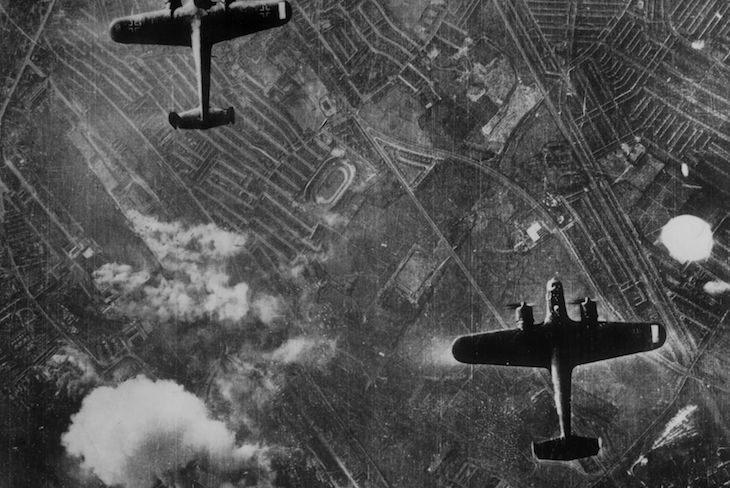On War and Writing by Samuel Hynes is hardly about war at all. There is little about combat here, or the actual business of fighting and killing — what Shakespeare wryly called ‘the fire-eyed maid of smoky war/ All hot and bleeding’. Hynes is an august scholar of English literature and particularly the literature of 20th-century warfare. But he also served as a bomber pilot in the Pacific during the second world war, and has written an engaging, plain-spoken memoir of his service called Flights of Passage, published in 1988. His two vocations, he explains in the introduction to his new book, are ‘professor’ and ‘pilot’, and here the professor not the pilot is at the controls.
This is a collection of essays and reviews, including a short account of his experiences working as an adviser for a TV series about the second world war, and some criticism of the war poetry of Thomas Hardy, W.B. Yeats and others. It is possible to trace a single line of thinking through these varied contents. There are two connected parts to this.
The first is that men dream of fighting the wars before the one they find themselves in. There is a little nostalgia in the hearts of soldiers, and all who look upon them, and this longing for an ideal past most clearly dominates our understanding of the second world war. ‘When you think of the scale of our war, and the absolute moral clarity we saw in it,’ writes Hynes, ‘it was inevitable that the next generation should imagine it as an epic struggle like the Trojan War.’ In America they still think of it as ‘the good war’, while few in Britain are immune to the lure of a Winston Churchill biopic; and Hynes suggests that there is something sentimental in even the preparation for modern war. As he recalls: ‘When I was commissioned as a Marine pilot in 1944 and went to draw my flight gear, I was handed a long white silk scarf,’ as if he were being dressed for glorious battle.
The second part of this idea is that, as Hynes puts it, ‘the more modern the war the more remote it has become’. As a bomber pilot, Hynes may have been wearing a white silk scarf, but he was also participating in a revolution in the technologies and strategy of warfare. Since the second world war, combat has been carried out by Western powers at an increasing distance from what the military historian John Keegan called ‘the face of battle’. Modern western warfare depends upon bombs dropped from unmanned planes, or drones, and this remoteness in turn entails an increasing sense that war is abstract, and to be passively endured. We see this in a change in the meaning of heroism. The Medal of Honor is awarded to American servicemen who have distinguished themselves with extreme valour. Hynes compares the citations for the medals awarded during the first world war and the Vietnam war, and argues that soldiers in the latter war displayed what he calls ‘victim courage’: this is bravery, for sure, but a bravery which assumes that death is inevitable instead of inconceivable.
Hynes is a brilliant critic, both of the literature of war and its myths. In this, the writer he most resembles is Paul Fussell, who fought in the second world war and wrote the best book about the first, The Great War and Modern Memory, published in 1975. Like Fussell, Hynes has a soldier’s familiarity with war combined with a literary scholar’s sensitivity to the patterns of stories. He suggests that poets have always been drawn to war because: ‘War enacts the great antagonisms of history, the agonies of nations; but it also offers metaphors for those other antagonisms, the private battles of our private lives.’ Beneath Hynes’s many local insights there is a constant story, of the peculiar and shifting shape of modern wars, for war has become increasingly metaphorical: we speak of the ‘war on terror’ and ‘culture wars’. So when Hynes is discussing poetry, he’s also — and most interestingly — describing the quality of modern war.
One resonant example from Hynes’s book suggests the similarity between literature and modern war. When Yeats writes in his poetry about war, Hynes notes, these poems are ‘not about war in a narrative sense: there are no battles. Nor in an epic or romantic sense, either: there are no heroes, no victories, no brave deaths.’
Hynes may as well be describing last night’s news or the front pages of tomorrow’s newspapers. We live in an age in which war has loosened its strict shape, has shrugged off its uniform: an age of messy, non-narrative wars, of sieges and drone strikes, of wars fought at a distance and without soldiers. Perhaps all modern warfare is a style of psychological warfare — war conducted in the head, in the stories and the fears of civilians — and this is also, perhaps, precisely why the guides we need are professors as well as pilots, or those who know both war and its many myths.






Comments